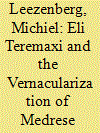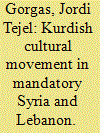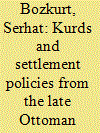| Srl | Item |
| 1 |
ID:
133820


|
|
|
|
|
| Publication |
2014.
|
| Summary/Abstract |
Eli Teremaxi's Serfa Kurmancî has not yet received the critical attention it deserves. It was dismissed by Auguste Jaba as a text of "minor interest," but in fact it is of paramount importance both for the study of the Kurdish language and for the history of Kurdish learning. Not only does it contain the oldest extant detailed remarks on Kurdish grammar, in all likelihood preceding even Garzoni's 1787 Grammatica; it is also among the first examples of Kurdish-language prose writing. The rise of prose texts of learning in Kurdish in the eighteenth century is an aspect of so-called "vernacularization," i.e. the use of a vernacular language for new purposes of written literature and learning. Vernacularization is, this article argues, a crucial prerequisite for the rise of a national language. The article also briefly discusses traces of a similar development in some of Teremaxî's near-contemporaries.
|
|
|
|
|
|
|
|
|
|
|
|
|
|
|
|
| 2 |
ID:
133824


|
|
|
|
|
| Publication |
2014.
|
| Summary/Abstract |
In the late nineteenth and early twentieth centuries diverse, and sometimes competing, movements of cultural renaissance emerged in the Middle East. Within this context, the Kurdish cultural renaissance in the Kurmanji dialect appeared relatively late and moreover its fruits were curtailed by two major events: the First World War and the establishment of the Turkish republic. From 1923 onwards, the task of animating the Kurdish cultural renaissance fell on the Kurds exiled first in mandatory Syria and Lebanon and then in Europe. In exile, Kurdish intellectuals benefited from some advantageous conditions such as freedom of speech and organization. Yet Kurdish intellectual endeavors in the Levant were to face political, social and economic challenges. Using French records and Kurdish newspapers, this article explores both the opportunities and the constraints for the consolidation of the Kurdish cultural renaissance under colonial rule. In doing so, the article intends to enrich the debate on the formation of nationalisms in the interwar era on the one hand, and the relationship between colonial powers and minorities in the Middle East, on the other.
|
|
|
|
|
|
|
|
|
|
|
|
|
|
|
|
| 3 |
ID:
133823


|
|
|
|
|
| Publication |
2014.
|
| Summary/Abstract |
This article highlights the continuities and discontinuities between the settlement policies of the late Ottoman state and early Republican Turkey. It argues that although there was a certain degree of evolution in the language employed by the state between the late Ottoman and Republican periods, there is a significant amount of overlap between the policies pursued by the Committee of Union and Progress which seized power in 1913 and the Kemalist regime established in the early 1920s towards the Kurds. In short, the emergence of settlement policies aimed at assimilating the Kurds into the Turkish nation are not an innovation of the Kemalists; it is possible to trace them to the late Ottoman period. This is substantiated through a comparison of two laws relating to settlement; the 1916 "Ordinance Outlining the Transfer and Settlement as well as the Sustenance and Maintenance for Refugees arriving from Conflict Zones" prepared by the Ottoman Ministry of the Interior's General Directorate for Tribes and Refugees and the Settlement Law of 1934, which was implemented in Republican Turkey and which remained on the statute books until 2006.
|
|
|
|
|
|
|
|
|
|
|
|
|
|
|
|